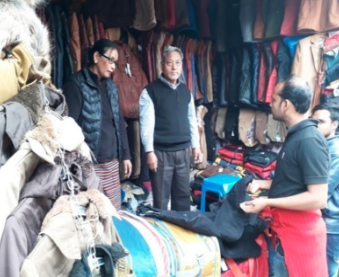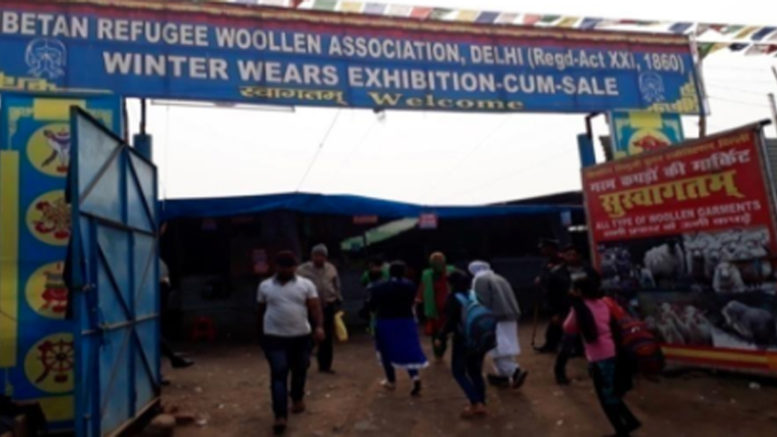Dharamshala: Tibetan refugees have illusively remained at the margins of financial services especially credit markets. Commercial banks and other institutional lenders have excluded Tibetan startups and businesses as they do not have conventional collaterals. In 2016, The Social and Resource Development Fund (SARD) has been granted with a limited fund from USAID for setting up a financial institution to pioneer a financing business to the most vulnerable Tibetan Refugees (TR) in exile. To pilot a lending undertaking, the programme named Tibetan Refugee Livelihood Support Program (TRLSP) was conceived and implemented under the SARD meant for segmented seasonal winter woollens selling communities all over India. The ‘winter sweater selling’ (WSS) business is the chief support of TR livelihoods in India affecting over 70% of the exile population. WSS is the main livelihood and income source for 45% of TR households in India. It is a tedious seasonal business, which provides relatively quick returns with little investment or capital requirements.
To provide an immediate relief to this community, SARD launched the TRLSP in 2017, which aims not only to resolve their capital needs by providing soft loans for their businesses but to foster economic development and mainstream financial inclusion within the Indian economy at large. After a series of surveys, the soft loan product was developed with the upper limit of 1558.42 USD at 3% rate of interest for a period of 6 months with no hidden charges. A total of 913 WSS businesses across India covering over 90 different locations availed the loan. Loans were extended to many women borrowers and many of the poorer members of the community. For the Central Tibetan Administration, this is the most extensive financial service ever provided during the last fifty years in exile. By March 2018, the loan recovery process was completed with 100% repayment.
SARD is supported through development assistance provided primarily by bilateral, multilateral, and other institutional funding agencies. These include the EU, USAID, DANIDA, and the Tibet Fund. TRLSP was supported primarily by funding provided by USAID and TTF. In addition, TRLSP involved considerable capacity building and training of Tibetan staff and support from several key institutional partners, including the Indian Institute of Banking and Finance, ICICI Bank, State Bank of India, Kangra Cooperative Bank, BASIX and Bandhan Bank.
To understand and record the experiences, outcomes, and key lessons learnt from TRLSP, a study was undertaken between December 2017 to January 2018. The study also attempts to provide a comprehensive picture of the existing status of the WWS trade and its corresponding livelihoods structure so that such programmes leave lasting impacts on Tibetan refugees. TRLSP have had several visible impacts felt throughout the WSS business. Some of them are systemic and may prove to be of critical importance to the refugee community in the longer term. Two of the most important impacts of TRLSP are enhanced financial inclusion and improved financial literacy for the Tibetan refugee community. Over 913 individuals directly benefitted from TRLSP and 4000 people benefitted indirectly. Many of these beneficiaries and loan recipients were women. In addition, TRLSP assisted many of the poorer members of the WSS community to obtain loans by providing specially designed and culturally appropriate loan documentation and processes.
Another visible impact of TRLSP was assisting individuals and families involved to make informed choices and formalize their WSS businesses. A surge in GST registrations, number of meetings held by chapters, increasing number of financing proposals and frequency of banking transactions are clear indications. TRLSP also indirectly strengthened the TRTA where over 16% new units joined the organisation and over 711 individual members renewed and sought new memberships by paying their fees. On the economic side, TRLSP helped to enhance the bargaining power of the smaller business both at buying and selling of their products. With the instant payment in cash, the smaller businesses gained tremendous bargaining power to get better quality goods at better prices, and more fashionable products for their small stalls. Normally the Lalas with trendy and top notch quality products do not provide or offer credit to smaller business vendors making their stalls look much inferior in the market. In the same market, bigger businesses have more turn over or daily transactions due to a variety of products and qualities they offer. TRLSP has helped Tibetan sweater sellers to bridge these gaps and thus level the playing field.
The WSS trade is characterised by its dispersed Market Stations, with most of them having a functioning Market Trading Association (MTA). Similarly, the WSS traders are settled in different settlements across many states. Each settlement has its own CTA representative Office and Settlement officer. The existence of such business groups (Market Station members) and community groups (Settlement Officers) give TRLSP the advantage of last mile connectivity across dispersed locations. The MTA and SO essentially provide a unique “credit enhancement” function that is made possible by the unique refugee status of the Tibetan community. These groups provide group responsibility and peer support similar to the role played by JLGs/SHGs in group lending process practised by MFIs and NBFCs. The importance and effectiveness of the MTA and SO in providing “know your customer,” loan processing, and collection services is a critical lesson learned from the TRLSP pilot, with possible implications for other refugee lending programs in other communities.
Women-headed households/Women-headed WSS enterprises from different settlements/market stations were interviewed. They were in the age group of late-forties to late-fifty years. They take on the role of heading the household which included parents/in-laws and children after the expiry of their husband. In one case, a woman’s husband was suffering from a fractured leg so she had become the main actor in the WSS enterprise.
They start involving in the trade business along with their parents/husbands right when they were in their 20s, and have experience of being involved in the trade for over 20 years including both before and after marriage. In most cases, their children don’t visit the market even if the school/college winter vacation is on and they go home to the settlement. In some cases, they get support in the trade from a brother or uncle. In a few cases, older daughters play active
roles in the WSS supporting their parent(s) as needed after the completion of studies and/or during their winter vacation from school/college, when they go stay in the market station and help in the market and sales.
The TRLSP loan has been sanctioned on priority to such applicants, especially for lower income segment. They travel with fellow-trader friends to Ludhiana and/or Delhi for stock purchases. Back in the Settlement, they manage the household and family. Where the family owns farmland they involve in farming. In the Settlements in HP like many other families, they run a shop during the remaining months in the Tibetan Market, selling summer/ladies’ wear. These are purchased from wholesale markets in Delhi. As for women playing leadership roles, the Jaipur Market Trader’s Association (MTA) head (Chairwoman) is a 63-year-old lady – and she heads the largest and a very dynamic MTA.
Such success have paved the way for several more products covering other marginalised sections of Tibetan society who are as credit worthy as the WSS group.
For detailed information, you may like to visit the link provided.
– Filed by Ms Mona Dikshit (Freelance Consultant)

Tibetans selling winter wears.

